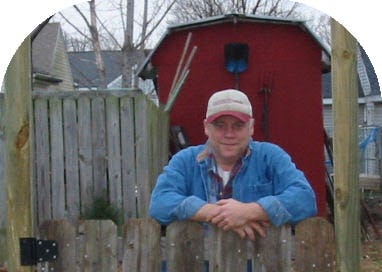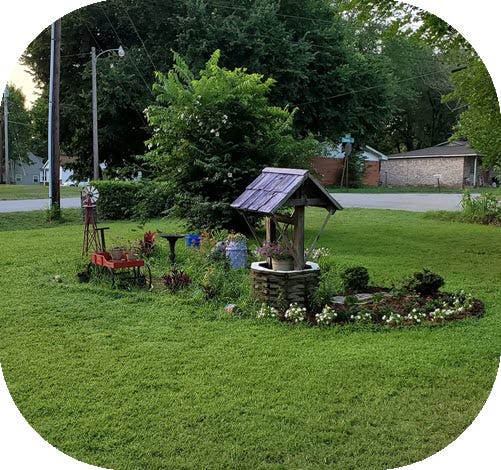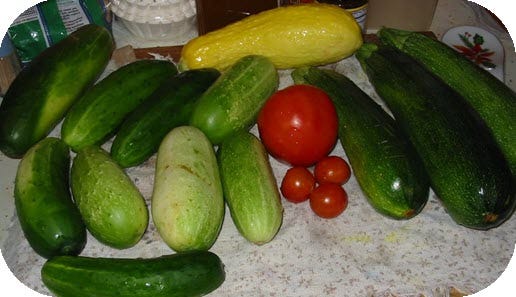The Write Road: On Tending Your Word Garden
"Terrible first drafts are the compost from which good writing grows." (Author unknown, but I like it)
Want to listen? Great idea if you’re driving. ;)
I'll admit it.
I'm skeptical of most analogies. Too many writers stretch them past the breaking point, trying to make every detail fit perfectly. But sometimes an analogy just works, even if it gets a little messy.
Speaking of messy... let's talk about writing.
And gardening.
Because after years of doing both, I've realized they have more in common than you might think.
Planning your word garden
Our little green house sits on a corner lot at the intersection of Florene and West Anne.
The side yard to the east of the house is huge by many standards. Plenty of room for the grandkids to run and jump and play without crashing into anything.
Well… almost anything.
With two benches and a fire pit under the old oak tree by the south road, it's a great place to relax.
The back yard, on the other hand, isn't quite as big. Even so, it's kind of in the "Goldilocks Zone" for a veggie garden. Not too big, not too small.
Just right!
So quite a few years back, we set to planning one.
I measured off the ground, which would have a nice gate and a rabbit fence surrounding it.
Then we drew it out on paper and planned what veggies would be planted in each location.
Because we did a little homework, we understood that certain plants do better when placed next to other species. And we planned accordingly, buying the seeds and starter plants we wanted to grow.
We based the size of the plot according to what we wanted to do with it. We would eat from the garden's bounty, share with family and neighbors, and give the rest to a local food bank or the widow ladies at church.
Planning out your word garden is similar.
You really should plan it out. What do you want to accomplish with your writing?
Is it for personal pleasure? To share with friends and neighbors?
Maybe make a little cash or even a living from it?
And what type of writing do you want to do? That will help determine the "seeds" you need to acquire. Like training courses or study books, and even the type of technology and software you need to purchase.
Where you want to plant your garden sometimes depends on the purpose and what you have on hand.
I started out on the kitchen table, but my word garden grew as time and work allowed.
Now I work from a home office, complete with mini fridge and a coffeemaker.
Oh... and a computer, too, of course.
And I write for clients all over the world, not just locally.
Planting your word garden
Once we decided on what we wanted to grow and had purchased the seed and plants, it was time to stick them in the ground. After all, they needed dirt to grow and the starter plants would soon outgrow their, uh, cribs.
First, we put up the gate and the "rabbit-proof" fence (which really wasn't all that much of a bunny barrier, to be honest. But that's okay).
After making a stop at our local home improvement store that begins with an “L” to buy a tiller, it was my job to work the ground and make a good home for the seeds.
The soil was covered with grass and had never been worked. So after three rounds of tilling, buckets of sweat, a body full of sore muscles (and just a bit of cussin', but not too much), the garden was ready to plant.
And plant we did, following all the instructions we'd collected, hoeing the dirt into straight, neat furrows, poking some holes, and planting the seeds. And digging some bigger holes to plant the starters, using some fertilizer to give them a good chance of survival.
And water.
Lots and lots of water.
Some of the same principles apply to a word garden.
You can gather up all the tools you need, both hardware and software (or pencil and notebook), and even get the books and courses and other resources purchased that you might need.
But if they sit on your shelf gathering dust like that fancy composter I bought for the next season and never used, they're nothing more than expensive bookends.
Or worse – a reminder of what you meant to do but never quite got around to.
The truth is, all the writing courses, fancy software, and ergonomic keyboards in the world won't write a single word for you. Just like those seed packets won't magically transform into tomatoes while they're sitting in your garage.
You've got to actually plant something.
Tending your word garden
Now, anyone who's ever grown anything knows that planting is just the beginning. You can't just stick seeds in the ground and expect a bumper crop come harvest time. Trust me – I learned that the hard way.
Gardens need constant attention. Weeds pop up overnight like unwanted adverbs in your prose. You've got to water regularly, even when you don't feel like dragging that hose across the yard. And let's not even talk about the bugs and critters that want to feast on your hard work before you do.
Writing's no different.
That first draft?
It's like those scraggly seedlings that first poked through my garden soil. The ones that made me wonder if I'd actually planted vegetables or just created the world's most expensive weed patch.
Half of them looked drunk, leaning every which way, and I swear one tomato plant was growing sideways just to spite me.
But here's the thing – you can't serve a seedling for dinner, no matter how proud you are that it sprouted.
Here's where the real work begins.
Editing is your weeding process. You've got to yank out those unnecessary words, the repetitive phrases, and the sentences that seemed brilliant at 2 AM but make zero sense in the light of day.
Sometimes you'll pull so many weeds you wonder if there's anything worth keeping.
(There usually is.)
Revising is like pruning – cutting back the overgrowth so the good stuff can flourish. Maybe that 2,000-word tangent about your childhood needs to be trimmed to a paragraph.
Or that clever metaphor you're so proud of?
It might be choking the life out of your main point.
And just like watering and fertilizing, you need to feed your writing regularly. Read good stuff. Study how other writers solve problems.
Keep learning the craft.
Because neglect is the fastest way to kill both gardens and writing careers.
The hardest part?
Consistency.
It's easy to be enthusiastic when you first plant. But week after week, month after month, when the novelty wears off and the work feels endless?
That's when you find out if you're a real gardener… or writer.
Some days, you'll want to give up. The tomato plants get blight. The rabbits eat your lettuce (despite that "rabbit-proof" fence).
Your article gets rejected. Your client wants seventeen revisions.
But you keep showing up. You keep pulling weeds. You keep watering.
Because that's what gardeners do.
And that's what writers do, too.
Harvesting the bounty
Here's the beautiful thing about gardens… and writing. The harvest comes in all shapes and sizes, and not always when you expect it.
My first tomato that summer was pathetic. Lopsided, about the size of a golf ball, with a weird spot on one side. But I'll tell you what – it was the best darn tomato I'd ever tasted.
Not because of the flavor (which was, honestly, just okay), but because I grew it.
Same goes for your first finished piece of writing. Maybe it's just a blog post that twelve people read (including your mom). Maybe it's a letter to the editor that actually gets published.
Or maybe it's that first client who says, "Yes, I'll pay you to write for me."
Each one is a harvest.
Some seasons, you'll have more bounty than you know what to do with. Articles published, clients knocking down your door, checks rolling in. You're giving away “zucchini” to anyone who'll take it, just like you're turning down projects because you're booked solid.
Other seasons?
Well, let's just say there's a reason they call them "lean years."
But here's what I've learned from both gardening and writing. The real harvest isn't always what ends up on your plate – or in your bank account.
It's the satisfaction of creating something from nothing. The pride of seeing your byline in print. The thrill when a reader says your words made a difference.
The confidence that comes from knowing you can support your family with your words.
It's even in the failures.
That novel that never got published taught you how to finish something big. Those rejected articles showed you what didn't work.
The clients who drove you crazy? They taught you to spot red flags before signing contracts.
And just like gardening, once you taste that first success, however small, you're hooked. You start planning next season's garden while you're still harvesting this one.
You're outlining your next article before the current one's even published.
Because now you know the secret… if you plan it, plant it, tend it, and stick with it, something will grow.
It might not look exactly like what you imagined. Your word garden might produce essays instead of novels, web copy instead of poetry, technical manuals instead of the Great American Novel.
But it'll be yours.
Grown with your own hands, from your own effort.
And trust me – that first harvest, whatever it looks like, will be the sweetest thing you've ever tasted.
Because… you… did it.
"Till" next time,
Steve M.










As both a writer as well as a gardener ..., I thoroughly enjoyed your article! The comparison of the two was most fitting as well!
Steve -- This is so true! You have offered a lot to digest (compost?). I especially love your comparison of weeds and "unwanted adverbs"!